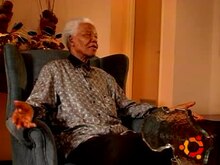Ubuntu (philosophy)
Ubuntu , pronounced [ùɓúntú] , describes a philosophy of life that is practiced in everyday life based on African traditions, especially in South Africa . The word Ubuntu comes from the Bantu languages of the Zulu and Xhosa and roughly means “ humanity ”, “ charity ” and “ community spirit ” as well as the experience and the awareness that one is part of a whole.
This describes a basic attitude that is based above all on mutual respect and recognition , respect for human dignity and the striving for a harmonious and peaceful society, but also on the belief in a "universal bond of sharing that connects everything human". In the Ubuntu philosophy, one's own personality and the community are closely related.
Ubuntu also contains political and religious-spiritual aspects that emphasize the responsibility of the individual within his community. There are attempts by the South African Constitutional Court to include this African cultural value in the interpretation of fundamental rights in the South African constitution .
In the Rwandan / Burundian language ( Kinyarwanda / Kirundi ), Ubuntu also means free .
Institutional Uses
- Ubuntu is the founding philosophy of the Ubuntu Education Fund and is the motto for the 76th General Convention of the Episcopal Church of the United States of America .
- The Ubuntu Party received 0.04% of the vote in the parliamentary elections in South Africa in 2014 under Michael Tellinger .
- Ubuntu gave its name to the free Linux distribution Ubuntu .
literature
- Michael Onyebuchi Eze: Intellectual History in Contemporary South Africa . Palgrave Macmillan, 2010, ISBN 978-0-230-62299-9 .
- Claude-Hélène Mayer: Intercultural mediation in the field of tension between Western and African perspectives . In: D. Busch and H. Schröder (eds.): Perspektiven Interkultureller Mediation. Studies on intercultural mediation 2 . Peter Lang, Frankfurt 2005, pp. 245-266.
- Claude-Hélène Mayer and Christian Boness: South African cultural standards . Action-relevant knowledge for specialists and managers . In: Africa Spectrum 38. 2003, pp. 173-196.
- Willem de Liefde: Ubuntu . Signum, Munich 2006, ISBN 3-7766-8007-5 .
- Michael Tellinger: The Ubuntu Principle. Hesper Verlag 2014, ISBN 978-3-943413-12-0 .
Web links
- Tutu, Desmond (in conversation with Uli Jäger) (2009): A person is a person through other persons
- Africa's Ubuntu - The Philosophy of Humanity . Source BR 2 " radioWissen " (audio 22:37 min.), Broadcast on March 9, 2016 (here: ARD media library , accessed on September 3, 2018)
Individual evidence
- ↑ http://kinyarwanda.net/index.php?q=ubuntu&start=0
- ^ Ubuntu Education Fund
- ↑ 'Ubuntu': Logo design contest seeks to convey General Convention theme. Episcopal Life Online, April 28, 2008, accessed December 26, 2015 .
